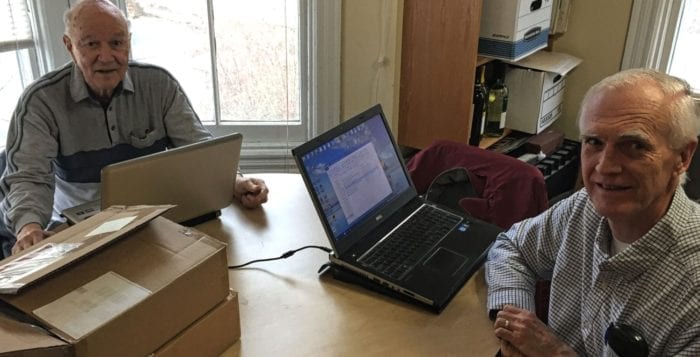Ship shape genealogical research at The Whaling Museum in Cold Spring Harbor

Don Eckerle and Mark Waldron know a thing or two about history. They have poured through tens of thousands of marriage licenses, birth records, death certificates, military enlistments and even Titanic claims — and now, for the first time, through hidden records of Cold Spring Harbor’s whaling history.
The two Kings Park residents are trustees of the German Genealogy Group, an organization established in 1996 to provide genealogical research support. The group currently hosts a website (www.theggg.org) that indexes genealogical research aids freely available to its 1,100 members and the general public, assisting people from Long Island and beyond to find their roots. The records are chiefly centered in the New York metropolitan area and represent all nationalities. Additional indexed records are continually being added to the website, many of which are not available on other sites.
The Whaling Museum’s collection is both a local and nationally significant resource for preserving our cultural heritage, but the archives are largely unknown to the general public. A generally untapped resource, the collections provide insight and documentary evidence of Cold Spring Harbor’s infrastructure and Long Island’s development not found in any other repository. The collections contain 95 percent of existing manuscript material from the Cold Spring Harbor whaling fleet, including photographs, correspondence, ledgers, scrapbooks, crew lists, ship logs, journals, deeds, poems and records that document the people, places and moments from the 18th to 20th centuries. A significant portion of the collection documents 44 voyages by nine local ships from 1836 to 1862.
Beginning in 2016, Eckerle and Waldron painstakingly examined the collection folder by folder, carefully lifting names into an index containing the name of the person or company, the year of the record, the type of record and its location in the museum. Their project resulted in gathering the names of 4,000 people.
“Long Island possesses a vibrant and fascinating maritime heritage. Periodically, we receive research requests from people exploring their ancestry or scholars investigating individuals, which up until now was a wild goose chase,” said Executive Director Nomi Dayan. “Don and Mark’s tedious work greatly enhances the accessibility of our archives to serve as a first level of research support. We are hopeful this project will result in an increase in public interest and build advocates of this important cultural heritage resource,” she said.
Waldron noted, “The records indexed for The Whaling Museum are a perfect example of what we try to do. It was surprising to see the wide variations in the types of documents: crew lists, ship owner lists, personal letters, obituaries, probate records, land deeds. Some of these records go back to the 18th and early 19th century. There was even a page that had the words to the song “Yankee Doodle” published for a July 4th celebration in 1803!”
Waldron has been researching his own family history for 22 years and belongs to several genealogy organizations. “When I first began, most of the research was done via microfilm, which was very slow and tedious. The advent of on-line indexes and records has made genealogical research much easier. Creating digital indexes to records is very rewarding, especially when the archive tells you that they are receiving record requests due to the index we’ve created.”
Eckerle has traced one family line back to the late 1500s in France. “Through my research, I was able to even trace one daughter-in-law’s family line back to the Mayflower and connected her to a few very significant men in the Revolutionary War period.”
The index is available through www.theggg.org as well as www.cshwhalingmuseum.org.






